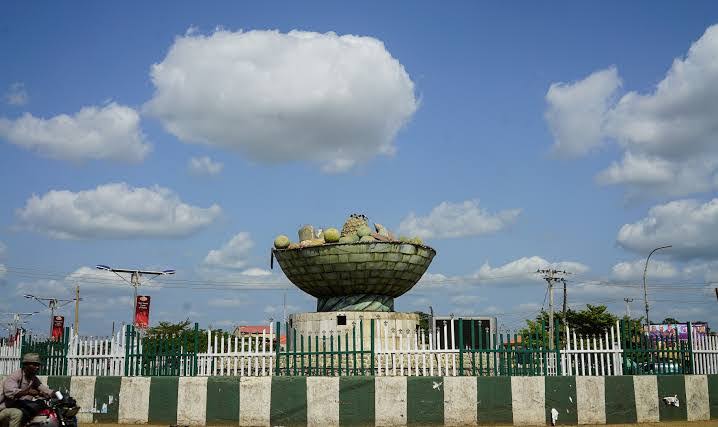🌿 Ruzu Non-Alcoholic Herbal Bitters
Ruzu Non-Alcoholic Herbal Bitters is a natural health supplement specially formulated to:
- ✅ Promote general wellness
- ✅ Detoxify the body
- ✅ Support the treatment of various ailments
Made from a powerful blend of 100% organic and medicinal herbs, Ruzu is completely alcohol-free, making it ideal for:
- 👪 All age groups
- 🌱 Health-conscious individuals
- 🌿 Anyone seeking non-alcoholic herbal remedies
Whether you're looking to boost your vitality, cleanse your system, or support healing the natural way, Ruzu Bitters offers a trusted herbal solution.
Benue, a state in North Central Nigeria, is renowned as a major hub of food production in the country. For this, the state is acclaimed to be the ‘Food Basket of the Nation’. In recent years, however, its vast farming communities have been under siege by bandits, with inhabitants forced into either strange communities or Internally Displaced Persons camps (IDPs). The major casualties of this untamed criminality are vulnerable children, women and the aged who face hunger and starvation leading to severe acute malnutrition.
To understand the dangerous dynamics of banditry on the ‘Food Basket’, ADEDOKUN THEOPHILUS travelled through some of it’s communities – Gwer West, Katsina-Ala, Okpokwu and Logo local government areas – and unravels a food crisis affecting children in many vulnerable communities
It’s was a scorching Saturday afternoon in July in Naka Village of Benue State. Alhaji Sonte, a fifteen-year-old lad with a frail body frame was scavenging for food and picking remnants of maize mixed with sand and chaff in the front of a stall.
In haste, he picked, packed and moved from stall to stall. This has been his daily routine for survival.
Sonte is one of the children pushed to leave their homes and displaced due to bandits’ attack on Mbapupuu, a rural community in Benue. Since then, things have fallen apart.
Alhaji Sonte, 15-year-old lad, frail and stunted by malnutritionPhotoCredit Adedokun Theophilus
Although Sonte intends to become a soldier, he is worried because hunger has whittled down his dream. This is due to his physical deficiencies to attain the requisite weight, size and height to achieve his dream. His stunted growth is triggered by the absence of certain nutritional components in his food.
Unbothered about his height, Sonte said: “If I had been eating nutritious food, I would be fat, hale and healthy” as his emaciated chest got strained by breath.
Although there is an unparalleled food crisis being experienced globally, according to Save the Children (SC); however, child malnutrition instigated by banditry and insecurity constitutes a grave threat to the survival and existence of children in Benue State, putting them in unimaginable health challenges and severely stunted growth. Little efforts seem to be made to address this issue by the state government.
Studies say nutritional deficiency in the early stage of a child’s development produces morphological changes and limits their capacity to become part of the competitive world.
Stunting is a result of chronic or recurrent undernutrition and it holds children back from actualising their physical and cognitive potential, said the World Health Organisation, noting that it is prevalent in poor socioeconomic conditions. UNICEF corroborated this by putting the number of Nigerian children with severe acute malnutrition at two million. It further stated that Nigeria is a country with the second-highest burdened with stunted children globally.
Laborious Lives: From Bountiful to Banditry to Begging
Investigations show that many rural farming communities have been turned into insecurity hotspots and banditry blankets, fueling child malnutrition. Many villages have become mere touchstones and connection to the past lives of farmers and their bountiful harvests.
Relevant authorities failed to protect farmers, save their crops and draw back the cumulative assets of their productive agricultural products for investment and development purpose.
Boniface Anyebe had lived as a successful farmer until tragedy struck Igama Village in Edumoga District of Okpokwu LGA in 2022. That day, hundreds of bandits invaded his village, gruesomely murdered his son, burnt down his house, destroyed farmlands, and carted away his harvests.
Boniface Anyebe, a grandfather whose son was murdered, house razed, farmlands destroyed and livelihood lost to banditry attacks in Igama, OkpokwuPhotoCredit: Adedokun Theophilus
His son, the family’s breadwinner as Boniface aged, was among the resistant fighters killed when they attempted to repel the attack on Igama.
Since then, the octogenarian has lived with a scar of loss and heavy weight of responsibility to cater for the welfare of his seven grandchildren. Sadly, things got tougher for Boniface as he is now forced to engage in laborious activities to make ends meet. Tiredly-looking like a bag of skin and bones sinking in the flesh, Boniface has been relegated to a dependent.
“It is not certain that you must eat once or twice in a day,” he said dejectedly, Boniface, conscious of the cost of living crisis, coupled with the first-hand terror experienced by relatives, has made him less entitled.
Boniface’s granddaughter, Christiana Anyebe, expressed that feeding was not certain every day. Food comes by luck, and other times, the sixteen-year-old girl, with her younger siblings, would stay two days without eating.
The watermarks of hunger and malnourishment are obvious in the bony and wrinkled skins of these children yet they have not benefited from any palliative from the state government.
For Kate Amodu, though 17 years, she has already had her fill of adult experience. A native of Entekpa ward in Otukpo LGA, she is one of the many children separated and displaced by banditry. Since the invasion of her village, her diet components have changed and feeding becomes more difficult because her parents stay far away.
Her fight to win the battle against hunger proved abortive. It persists. Yet Kate has returned to school but this allows her less time to engage in menial work and raise a stipend for her sustenance. “We don’t have farmland here in Otukpo,” she said as the tired bags around her eyes pumped.
17-year-old Kate Amodu , displaced from her family due to incessant attacksPhoto Credit: Adedokun Theophilus
Hidden Hunger: “Food Everywhere but Nothing to Eat”
Tamen Terungwa is a boy, naïve and down-to-earth, but with the survival instincts of a grown man. He has seen all that life has in stock except death. His narrative was not different from other tales of violence and invasion.
After bandits attacked Mbabuande Village in Gwer West local government area, he became indifferent to education. The idea of returning to school no longer crossed his mind as he begs to feed.
On the day this reporter met him he dejectedly explained that he had not had any meal for the day because he did not go out to beg. “We normally go to the market square and beg for food but I haven’t gone to the market to beg,” the little boy said.
Self-providence in times of crisis stings but being the breadwinner of a large family in times when inflation rises to its peak is deadly. Elaigwu John is the head of a family of eleven. He commercially tilled land and cultivated crops, which he had used to fend for his family and meet their demands. But his source of livelihood collapsed when suspected Fulani bandits attacked his village, Ewule Entekpa. Since then, fulfilling his fatherly responsibilities has become difficult.
Terungwa, a boy from Gwer West.PhotoCredit Adedokun Theophilus
Sad that he could no longer farm, or afford to feed his children, he decried that eating non-nutritional food has become a paramount diet for his children.
“Now, we don’t have sufficient food and if we are lucky, we sometimes eat once or twice. We now eat the last product that comes out from cassava, not garri” (describing a sponge chaff) he said as his dawdling voice heralded an accustomed sign of misery.
Blessing Tarka is two years and some months old. She was a lively girl until the day she fell and could no longer walk. Like others, her mother, Mercy Tarka, a native of Katsina-Ala LGA, was dislocated from her community by bandits and this denied the little girl access to certain nutrients that could aid her growth. Her mother had been sad and efforts made through a series of visits to traditional healers have proven abortive. She, however, hoped that her daughter would walk again one day.
Mercy tried to keep her head above water in the battle against malnutrition through loans, begging, and food remnants. Also, her daughter kept crying due to hunger.
“She stopped walking one day after banditry attacked on our village”, she lamented.
Mercy now involves her children in processing the garri of other farmers in their host community to eke out a living.
Displacement and Divorce Fuel child, adult malnutrition
The faces of adults are also postcards of malnutrition. The lines and wrinkles tell stories beyond wreckages and ruins. It expresses grief, starvation and hunger suffered in silence.
Torto Benjamin, a native of Gbwanga Village in Gwer West and father of five, was not only displaced by the incessant attacks of bandits; he has been dislocated from his children. His wife divorced him after everything went south; his children were separated from him and distributed to extended family members who were facing crisis. His family was torn apart and it was as if they never existed.
A picture of unsorted beans, maize and millet picked from the marketPhoto Credit: Adedokun Theophilus
Noting that he knew what his children could be facing, he lamented that he could not help himself. “When my wife left, she took the children along with her and I understand that she has shared my children among her relatives,” Benjamin said, adding that his own relatives were in the same shoes as he was. “I worry about their survival and what my children eat at this time,” Benjamin said.
Although he struggles to make ends meet as a labourer, he suffers from constant ill-health and finds it difficult affording his medical expenses. Both parents and children are at the receiving end of detrimental, long-term emotional and psychological consequences that may be worse than leaving and separation,” say psychologists, while banditry fuels separation and is associated with an elevated risk for subsequent violence.
“I have reduced the quantity and quality of food that I prepare for my children,” said Christiana Alechenu, a mother of three. Christiana disclosed that the drastic reduction was essential for their survival. She, however, called the government to provide palliatives to be able to afford to give her kids healthy foods, noting that the support she gets from her host neighbours has been immeasurable.
Adiku Uvernyumbe, an aged woman from Ukum, said that managing to fend for her two daughters has not been easy. Ukum LGA is in the Sankera area of Benue State worst affected by banditry.
sorted-image-of-millets-maize-and-beans.Photo Credit: Adedokun Theophilus
“I collect grains, maize and rice gathered from the ground in the market square,” she explained, stressing that fear and the paltry harvest she got from her farm after herder’s attack forced her to leave her village, Chito.
The cries of despair are state-wide.
Begi Nyangoh, a 55-year-old woman with five children, survived like others. Although she claimed that she got support from the government, she still visits the market square to scavenge for chaff for her family and children. She dreads the day it might be impossible to get chaff and leftover food in the market, a situation that will worsen their condition. “If there is no way to get crumbs in the market, maybe that is the end or we go on to eat leaves,” she said.
A traditional ruler in Okpokwu, who pleaded anonymity for fear of retribution from state authorities, expressed sadness over the state of things in his community and the seeming inaction or helplessness of the state government to security challenges. He lamented that the insecurity situation in the area does not only fuel malnutrition and loss of livelihood, many families have been forced to begging due to prevailing situation.
Everyone is on the same vessel and nobody is excluded in the war waged by hunger. According to Boniface of Igama village, “it is a life of mystery to depend on people and providence”.
Since banditry cut off their sources of livelihood, which is predominantly farming, there have been pocket-size supports or none from the state government. Many families have resigned to fate or sweeping remnants of food in market stalls to feed their wards.
Elaigwu John is the head of a family of eleven. A successful farmer who can no longer fulfil his fatherly responsibilitiesPhoto Credit: Adedokun Theophilus
Cost of living crisis
Nigerians have been grappling with the worst cost of living crisis in decades since President Bola Tinubu’s controversial economic reform on May 29. The nation’s economy is at a boiling point while Nigerians are angry over sporadic inflation which rate rose to 34.19 percent in June 2024, a 28-year high, according to the National Bureau of Statistics (NBS).
This is attributed to the higher cost of transportation, housing, and utilities and the hike in the prices of food items such as groundnut oil, palm oil, coco yam, cassava (potatoes, yam and other tuberous crops) and so on.
NBS reports on the trend of its consumer price index (CPI) for Benue State is deployed as an instrument to measure the inflation rate of food produce and quality shows and to estimate the average variation between two given periods in the prices of household products.
Benue State witnessed a 34.48 percent increase in food inflation between June 2020 and the same month in 2024.
It reported that in June 2020, there was a 2.41 percent increase in food inflation. The statistics think tank found that food inflation in 2021 amounted to 22.08 per cent, while in 2022, food costs dropped by 20.12 percent.
It unexpectedly surged again in 2023, climbing to 26% by June.
Ultimately, Benue State’s inflation rate reached a startling 36.89 percent in the same month of 2024.
Trend of Food Inflation in-Benue, Source NBS… Photo Credit: Adedokun Theophilus
The 2023 Global Hunger Index ranked Nigeria 109th out of the 125 countries with a dearth of data to address and calculate hunger. It stated that Nigeria has a level of hunger that is serious.
Even though another report pointed out that Nigeria, among other countries like Afghanistan, Haiti, Nigeria, Somalia, South Sudan, Sudan, and Yemen, as well as Burkina Faso and Mali in the Sahel region, had the highest level of severe hunger in the previous year, it emphasised that conflict and climate change are key drivers of these crises and economic downturns.
Data analysed from the global think tank on security, the Armed Conflict Location and Event Data (ACLED) revealed that a total of 2,047 fatalities were recorded between 2020 and 2024 in Benue State. These deaths were caused by organised violence, bandits’ attacks, militias, rebel groups, and identified militias across 145 locations in the state.
Experts said that the absence of food commodities is the bane of the malnutrition diet crisis, stressing that unsuccessful efforts to curb insecurity – banditry, kidnappings and killings – worsened food production.
Research showed that banditry disrupts commercial activities in Benue State. Aside from the psychological effects of banditry on parents, their economic productivity and income are hindered, evidence from studies shows. It explained that parents experience economic downturns and that it exacerbates unemployment, malnutrition and starvation.
Makurdi Internally Displaced Persons Camp, PhotoCredit Adedokun Theophilus
Experts explain that malnutrition is entirely preventable at the community level through the adoption of lipid-based nutrient supplements and fortified cereal products.
A public health physician for the National AIDS and STI Control Programme (NASCP), Reinnet Awoh, told this reporter that the state partnering with international organisations like UNICEF, the World Food Programme (WFP), and other local non-governmental organisations to provide immediate food aid to affected families is crucial.
Emphasising that the collaboration would involve distributing food parcels containing essential nutritional ingredients and therapeutic foods for severely malnourished children, Awoh suggested that regular distribution of micronutrient powders like vitamin A supplements and other essential nutrients to children and pregnant women should be introduced in the state.
He said: “The government should deploy mobile health clinics to reach remote and affected areas so it can ensure regular health check-ups, nutritional assessments, and treatment for malnutrition. These clinics can also provide vaccinations and other essential health services.”
Makeshift tents of the internally displaced persons camp in Naka., PhotoCredit Adedokun Theophilus
Olugbenga Jagun, a dietitian in the University of Abuja Teaching Hospital, corroborated Awoh by stressing that government should provide protection services for affected groups and promote sustainable agriculture practices. He also emphasised the importance of fortification of staple foods with essential nutrients and regular health check-ups to monitor growths and ailments.
Speaking, lead researcher of Pol Eco Analytics, an Abuja-based think tank, Folarin Olamilekan, suggested that the adoption of people-centred and agriculture-orientated policy would mitigate the hardship Nigerians are facing. “Policy that would reduce transportation on food commodities, assist farmers on seedling, farm tool and access to markets should be introduced,” he said, emphasising the need for the government to collaborate with relevant stakeholders to salvage the situation.
Cost of violent conflicts
Communal violence cost Nigeria over $12 billion worth of losses in agricultural productivity during the last third of the 20th century, according to the Food and Agricultural Organisation (FAO).
Although a large number of natives have resolved to find shelter and solace across internally displaced camps, others begged and searched for chaff and spoilt foods.
Data analysed from the global think tank on security, the Armed Conflict Location and Event Data (ACLED) revealed that a total of 2,047 fatalities were recorded between 2020 and 2024 in Benue State. These deaths were caused by organised violence, bandits’ attacks, militias, rebel groups, and identified militias across 145 locations in the state.
“Addressing malnutrition requires a multifaceted approach,” said Jagun, noting the need to tackle malnutrition from its root by involving individuals, communities and government.
Governance deficits
With a staggering number of over 283,727 children suffering from stunted growth and malnutrition, the National Demographic and Health Survey report showed how the prevalence of underweight children stood at 13.6 per cent in Benue State.
Although the Benue State Government said it prioritises the health and well-being of its citizens, yet it remains one of the states with the highest rate of under-five with stunted growth.
Benue, in its 2024 fiscal budget, allocated 15 per cent of its budget to the development of the health sector. This addresses the teething challenges in the industry in line with the Abuja 2001 Declaration on Health pledge.
It vowed to strengthen social safety nets, provide support for the most vulnerable members and equally ensure that basic amenities are available for every citizen in the state. It states: “Our commitment to poverty alleviation extends to rural areas. This budget includes initiatives to improve agricultural productivity, access to healthcare, and educational opportunities in rural communities.”
Findings showed that the said improvements in the Health, Education and Agricultural sectors have yet to be realised.
“Malnutrition has remained a public health concern in Nigeria, which is also a major cause of death, especially in women and children,” said Priscilla Utoo, the deputy coordinator of Civil Society-Scaling Up Nutrition in Nigeria (CS-SUNN). She explained that malnutrition can lead to stunting with adverse outcomes such as poor brain and cognitive development, a loss of two or three, poor school performance and diminished productivity in adulthood.
Lamenting that malnutrition continues to worsen due to the non-approval of the state-formulated Strategic Plan of Action for Nutrition, she noted that the domestication of the National Strategic Plan of Action for Nutrition (NSPAN) resulted in meagre improvement.
comparative visualisation of Benue State Approved budgets for Health and Releases between 2020 and 2024Photo Credit: Adedokun Theophilus
The state government authorised 6.6 billion naira to the Ministry of Health and Human Services in 2020, findings indicate.
In 2021, over 5.9 billion naira was allocated to health in the state. By the 2022 and 2023 fiscal years, the state government projected to expend 11.5 billion naira and 22.3 billion naira consecutively as its health budget.
During its budget speech for the 2024 fiscal spending, the government approved over 9.4 billion naira, which represents 15% of its annual budget, shooting the total approved budget to 65.3 billion in five years.
Sadly, there have been a few releases and cash backing that ought to follow these massive appropriations, year in year out.
According to an analysis of the state’s health sector’s budget performance, 1.7 billion naira were made available in 2020 to tackle health issues, offset staff salaries, finance capital projects, and procure technological supplies. This sum, however, is 4.9 billion naira less than what was the authorised budget. This indicates that just 25.75 per cent of the allotted budget was disbursed.
Comparably, of the 15.2 billion approved for the sector’s budgetary releases for the state in 2021, a total of 8.5 billion naira was released. 55.5 per cent of the total resources allotted to the health sector that year were represented by the released sum.
A picture of the Chaff of cassava picked from the marketPhoto Credit Adedokun Theophilus
In 2022, the state made the largest investment in the health sector within the years of analysis. The released fund, which amounted to 9.4 billion naira, indicated that the reimbursement was more than in previous fiscal years. This, however, amounted to 81.7 per cent of the authorised spending.
As a result, the fiscal budget for 2023 was only released for 5.07 billion naira, a pitiful amount in comparison to the amount allocated for the health sector. The amount issued was 22.7 per cent of the approved budget, even though the budget covered that year’s personnel, capital, and recurrent expenditures.
The total releases throughout the analysed period were 24.8 billion naira.
Further findings show that 38 per cent of the approved budgets for the health sector were funded to address the lingering health issues and hunger in the state, according to a critical analysis of the state implementation budget.
Despite these problems and the situation faced by children, policymakers in the state appeared to be lax in their responsibilities and have not been able to map out adequate and comprehensive rural sustainable schemes that will be adopted to address health challenges.
To compound the health sector challenges in the state, the non-implementation of nutrition policies by the state government would cost the state N29 billion annually to resolve the problem.
Experts speak, authorities mute
The weight of the nutritional challenges bedevilling children in bandit-prone zones is immeasurable. Experts suggested that Benue State should develop and implement a state-specific nutrition policy that outlines clear goals, strategies, and responsibilities for addressing malnutrition. They asserted that the policy should be aligned with national guidelines and international best practices.
A deserted village along Naka-Makurdi roadPhoto Credit Adedokun Theophilus
Speaking, Adefolarin Olamilekan, lead researcher of Abuja-based think tank, Pol Eco Analytics, said the state government needed to prioritise the socio-economic wellness of rural community members.
“It is the responsibility of the government to cater for the health challenges of the people, especially in regards to malnutrition and poor balanced diet that is exposing the indigenes and poor healthy living. These call to question the use of the yearly budget of the state government, not to mention the various federal government interventions in the state,” Olamilekan stated.
He further explained that there is an urgent need to tackle corruption, embezzlement and revive the economic condition of people in the state.
Reinnet Awoh, public health expert with the National AIDS and STI Control Programme (NASCP), expressed that public-private partnerships should be embraced to curb food crises and child malnutrition.
Stressing that advocacy for legislation that supports food security, protects agricultural lands, and provides social protection for vulnerable populations is important, Awoh maintained that strong legal frameworks are essential for sustaining long-term interventions.
“Regularly collecting and analysing data on food security and nutritional status to inform policy decisions and track progress is crucial. This accurate data helps in identifying the most vulnerable groups and areas requiring urgent attention,” Awoh said, adding that tackling malnutrition involves a multi-disciplinary approach that includes immediate food aid, security enhancements to protect and support farming communities, strengthening agricultural policies and community-driven initiatives, such as communal gardens and cooperatives to complement government efforts.
Nutritionist Olugbenga Jagun of the University of Abuja Teaching Hospital however, stressed that economic empowerment, food security initiatives, social protection and thorough engagement of communities could be adopted alongside local policies to effectively mitigate malnutrition among children.
To ascertain if the Benue State Government has in place plans and programmes towards addressing child malnutrition in conflict-prone zones in the state, a letter was submitted on July, 10 to the Chief Press Secretary to the Governor, Tersoo Kula. The letter contains a request for an interview and a series of questions regarding the measures put in place to curb insecurity in the state.
This reporter enquired of the governor’s spokesperson to respond to questions regarding the programmes implemented by the state government aimed to address adult and child malnutrition.
The letter further requested documents regarding the question. However, at the time of filing this report, efforts made by the reporter had not been responded to by the governor’s spokesperson.
Similarly, a letter submitted on July 9 to the Benue State Emergency Management Agency seeking for its activities and programmes designed towards curbing malnutrition among vulnerable communities and children was not responded to as at press time.
This investigation was supported by the Wole Soyinka Centre for Investigative Journalism (WSCIJ) under the Collaborative Media Engagement for Development, Inclusivity and Accountability project (CMEDIA) with funding support by the MacArthur Foundation.
The post SPECIAL REPORT: Battered by banditry, hit by hunger: Benue, Nigeria’s Food Basket, now battles malnutrition appeared first on Latest Nigeria News | Top Stories from Naomisophyblog.
















